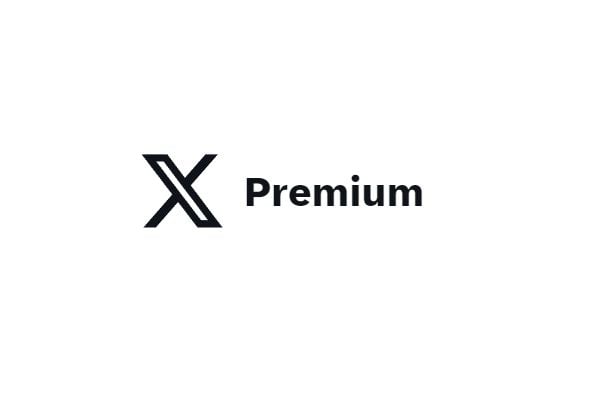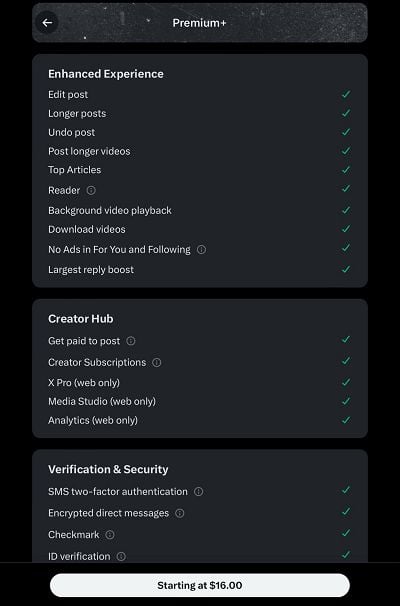SOCIAL
X Launches New Price Tiers for X Premium, Including an Ad-Free ‘Premium+‘

As promised by Elon Musk, X has now released two new tiers for its X Premium subscription offering, as it works to get more people paying to use the app.
The new tiers will supplement the current X Premium package, with “Premium+”, priced at $US16 per month, offering an ad-free X experience, and “Premium Basic”, at $US3 monthly, providing some of its additional features.
First off, on Premium Basic, X’s cheaper subscription pitch. The Basic package comes with some add-on features, including post editing, longer posts, and encrypted DMs.
It doesn’t give you a blue checkmark, though it does give you a “small reply boost”, meaning that your posts in the app are more likely to be seen.
Though what “small” means in this context is not clear. And evidently, X isn’t really sure yet either:
“Now, people on X will see a slight preference for replies from verified accounts over other replies. We’re currently testing the levels at which we prioritize content from Premium subscribers relative to the other factors we consider in conversation rankings.”
So it’s probably relative to how many users sign up, and how much that then influences the level of boost that X can give posts from paying users. But at this point, Basic subscribers will get a limited boost.
Which is better than nothing, but I’m not sure that it’s a great incentive.
Also, the fact that Basic users don’t get a blue checkmark seems like a missed opportunity. The issue with this is that almost all of the add-on Basic incentives are geared towards people who post in the app, but 80% of X users never post. So these options are not likely to be a big lure, even for $US3 per month, whereas a blue tick, at least in theory, might drive more sign-ups.
But then again, the checkmark now only shows that you’re a paying user, not a high-profile person, so maybe that’s not a big lure either.
Also, Basic users are not eligible for X’s ad revenue share program.
The “X Premium+” tier, meanwhile, includes all of the X Premium incentives, including the biggest new addition, in the removal of ads from your experience.

The $US16 fee will ideally account for the loss that X will incur by reducing ad exposure, with previous insights showing that X currently generates around $US12 per user, per month based on ad exposure. So it had to charge at least that, while also accounting for variances in ad intake.
The removal of ads could potentially be a high-value offering for at least some users, though the value of avoiding ads, versus paying $US168 per year (X’s discounted annual package) to use X is probably not a viable calculation for most.
But there are other benefits.
As you can see in the chart above, Premium+ users also get access to every subscriber benefit, while they also get the “largest reply boost”, which, again, will be relative to overall take-up. But, essentially, you’re maximizing your chances of your posts being seen, while also avoiding ads.
Maybe that’ll be appealing to brands, who don’t want to pay for X ads, though that could also see X’s reply streams filled with spammy promos and vague responses linked to viral posts.
Overall, it seems fairly pricey for an ad-free experience, which most people are already used to, so I’m not sure that it’s going to be a big seller. But the new offerings do provide alternatives, which should see at least some additional users subscribing to the app.
This is X’s latest push to boost subscription intake, which Elon believes is a key avenue to solving some of X’s biggest challenges.
By getting more users to pay for the app, that, at least in theory, will act as a disincentive for bot farms, because as more users subscribe, that will then better highlight the bot profiles in-stream, as they’ll be the non-paying, non-checkmark accounts. Though the new Basic package doesn’t give you a checkmark either, so it won’t be effective in this respect.
Reply boosts also mean that bot accounts, which can’t pay (as it requires a mobile number and credit card for each) will get less reach, which could, again in theory, make it harder for bot peddlers to gain traction in the app.
Various cybersecurity experts don’t think that this approach will actually work, but again, you can see the intended value of the push from this perspective.
More paying subscribers also gives X another revenue stream, so it’s then less reliant on ad dollars, and thus, less beholden to the whims of ad partners, which could better enable Elon’s more free speech aligned approach.
And finally, dismantling the old verification system gave Elon a chance to hit back at profiles that he personally has grievances with. This may have been the most damaging element, as by removing legacy checkmarks, Elon also de-valued the reputational boost aspect of the blue tick, but it does now enable him to, say, remove the blue tick from The New York Times’ account if he doesn’t like what they report.
The last point also highlights a key challenge in Musk’s overall approach at the app, in that his decisions are driven by ideology and personal perspective, as opposed to what’s best for the business. Musk now regularly shares his opinions on various divisive topics, and those leanings are also clearly defining X policy.
Some would argue that previous Twitter management was also guided by its own ideology, but much of that was based on advice from authorities and official information providers. Musk seems to be increasingly leaning on less reputable sources, and aligning X policies with such. And that, at least for advertisers, puts the app in uncomfortable territory.
But Elon seems determined to stay the course with his initial approach to managing the app, even though fewer than 0.5% of users have thus far signed up to pay for X Premium.
Will that change now that X has lower-priced tiers? Will X’s other payments experiment, in charging all new accounts a $1 fee if they want to engage in the app, actually see more money flowing into X’s coffers?
I have my doubts on both, but time will tell.

















